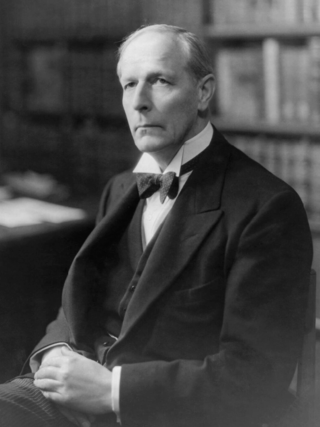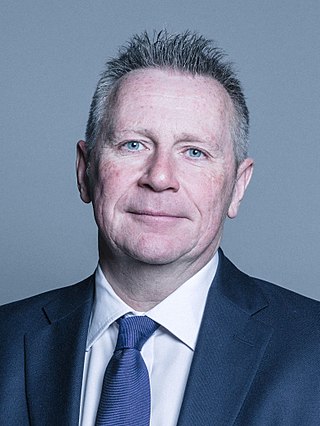Related Research Articles
Peerages in the United Kingdom form a legal system comprising both hereditary and lifetime titles, composed of various ranks, and within the framework of the Constitution of the United Kingdom form a constituent part of the legislative process and the British honours system. The British monarch is considered the fount of honour and is notionally the only person who can grant peerages, though there are many conventions about how this power is used, especially at the request of the British government. The term peerage can be used both collectively to refer to the entire body of titled nobility, and individually to refer to a specific title. British peerage title holders are termed peers of the Realm.

The Peerage Act 1963 is an Act of the Parliament of the United Kingdom that permits women peeresses and all Scottish hereditary peers to sit in the House of Lords and allows newly inherited hereditary peerages to be disclaimed.

Alastair Robertson Goodlad, Baron Goodlad,, is a British politician who served as Chief Whip of the parliamentary Conservative Party from 1995 to 1997, and British High Commissioner to Australia from 2000 to 2005. He was Member of Parliament (MP) for Northwich and later for Eddisbury from 1974 to 1999. Goodlad sat in the House of Lords as a life peer from 2005 to 2024.

The House of Lords Act 1999 is an Act of the Parliament of the United Kingdom that reformed the House of Lords, one of the chambers of Parliament. The Act was given Royal Assent on 11 November 1999. For centuries, the House of Lords had included several hundred members who inherited their seats ; the Act removed such a right. However, as part of a compromise, the Act did permit ninety-two hereditary peers to remain in the House. Another ten were created life peers to enable them to remain in the House.

Baron Hindlip, of Hindlip in the County of Worcester and of Alsop-en-le-Dale in the County of Derby, is a title in the Peerage of the United Kingdom. It was created in 1886 for the businessman and Conservative politician Sir Henry Allsopp, 1st Baronet. He was head of the brewing firm of Samuel Allsopp & Sons of Burton upon Trent, and he also represented East Worcestershire in Parliament.
In the United Kingdom, life peers are appointed members of the peerage whose titles cannot be inherited, in contrast to hereditary peers. Life peers are appointed by the monarch on the advice of the prime minister. With the exception of the Dukedom of Edinburgh awarded for life to Prince Edward in 2023, all life peerages conferred since 2009 have been created under the Life Peerages Act 1958 with the rank of baron and entitle their holders to sit and vote in the House of Lords, presuming they meet qualifications such as age and citizenship. The legitimate children of a life peer appointed under the Life Peerages Act 1958 are entitled to style themselves with the prefix "The Honourable", although they cannot inherit the peerage itself. Prior to 2009, life peers of baronial rank could also be so created under the Appellate Jurisdiction Act 1876 for senior judges.

William Allen Jowitt, 1st Earl Jowitt, was a British Liberal Party, National Labour and then Labour Party politician and lawyer who served as Lord Chancellor under Clement Attlee from 1945 to 1951.

David Arthur Russell Howell, Baron Howell of Guildford, is a British Conservative Party politician, journalist, and economic consultant. Having been successively Secretary of State for Energy and then for Transport under Margaret Thatcher, Howell has more recently been a Minister of State in the Foreign Office from the election in 2010 until the reshuffle of 2012. He has served as Chair of the House of Lords International Relations Committee since May 2016. Along with William Hague, Sir George Young and Kenneth Clarke, he is one of the few Cabinet ministers from the 1979–97 governments who continued to hold high office in the party, being its deputy leader in the House of Lords until 2010. His daughter, Frances, was married to the former Chancellor of the Exchequer, George Osborne.

In the United Kingdom, a tied house is a public house required to buy at least some of its beer from a particular brewery or pub company. That is in contrast to a free house, which is able to choose the beers it stocks freely.

William Lawies Jackson, 1st Baron Allerton, was a British businessman and Conservative politician.

Henry James Scrymgeour-Wedderburn, 11th Earl of Dundee, was a Scottish nobleman, soldier and politician.

Robert Antony Hayward, Baron Hayward, is a British Conservative Party politician and media commentator.
John Ernest Vaizey, Baron Vaizey was a British author and economist, who specialised in education.

Samuel Charles Allsopp, 2nd Baron Hindlip, was a British businessman and Conservative politician who sat in the House of Commons between 1873 and 1887 when he inherited the peerage.

Michael Arthur Bass, 1st Baron Burton,, known as Sir Michael Arthur Bass, 1st Baronet, from 1882 to 1886, was a British brewer, Liberal politician and philanthropist. He sat in the House of Commons from 1865 to 1886 when he was raised to the peerage as Baron Burton.
Charles Ernest Leonard Lyle, 1st Baron Lyle of Westbourne was a British industrialist and Conservative Party politician.

Guy Vaughan Black, Baron Black of Brentwood is Deputy Chairman of the Telegraph Media Group.

Graham Thomas Evans, Baron Evans of Rainow is a British politician who served as the Member of Parliament (MP) for Weaver Vale in Cheshire from 2010 until 2017. A member of the Conservative Party, he was appointed to the House of Lords in 2022.
The 1916 Newington West by-election was a parliamentary by-election held in England on 10 January 1916 to elect a new Member of Parliament (MP) for the House of Commons constituency of Newington West in South London.
John Hannett, Baron Hannett of Everton, is a British trade unionist and formerly General Secretary of the Union of Shop, Distributive and Allied Workers (USDAW). He was appointed a member of the House of Lords in 2024.
References
- ↑ Partridge, Eric and Jacqueline Simpson. The Routledge Dictionary of Historical Slang.
- ↑ The New York Times August 16, 1886.
- ↑ "Britain and the Beerage" The Pittsburgh Press - 28 August 1919". Google News. Retrieved 2010-03-17
- ↑ Hansard Debate 15 February 1995
- ↑ "Lords Hansard". Hansard. 14 November 2005. UK Parliament. Retrieved 11 September 2023.
- 1 2 "Parliament's Week". Feb. 23, 1931. Time. Retrieved 2010-03-19. A paraphrase of "Liquor Traffic Prohibition Bill". Hansard. UK Parliament. 13 February 1931. Archived from the original on Feb 28, 2021.
- ↑ "Beerage set for shake-up as S&N eyes Courage" The Independent. Retrieved 2010-03-17.
- ↑ Cryne, John "The Day The Beerage Died" CAMRA North London 2000 Archived 2008-11-20 at the Wayback Machine Retrieved 2010-03-17
- ↑ "Chucking-out time for Lord Young's beer curbs". The Independent.[ permanent dead link ] Retrieved 2010-03-19.
- ↑ Hamilton, Neil. "Why we have to save the Great British Pub". Sunday Express.
- ↑ Gwyther, Matthew (30 October 2003). "UK: End of the hereditary beerage". Management Today.